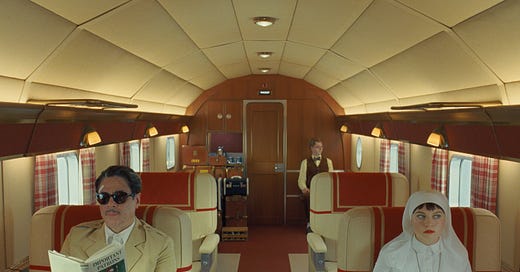‘The Phoenician Scheme’ is Wes Anderson’s winning take on a shady businessman’s redemption
Anderson's latest film, a Cannes debut out next week, isn’t just more of the same.
Wes Anderson’s new film The Phoenician Scheme may use a slightly different color palette than usual, while not being quite as dependent on the filmmaker’s established aesthetic as what you’re used to.
But it’s an Anderson picture through and through, while featuring a plot element familiar from some of the best of the director’s films: An older, wealthier man, who’s something of a jerk, but gets a slow-moving redemption, through a combination of encroaching mortality and rekindled relationships with his once-estranged children.
That was Royal Tenenbaum, in the Gene Hackman performance that I probably thought of more than any other following Hackman’s recent passing. And it was also Bill Murray’s Steve Zissou, as well as various other older men featured throughout the director’s filmography.
Set in a fictional Middle Eastern country, in a fuzzily defined past decade, The Phoenician Scheme is another Anderson film with a sprawling cast. However, unlike the last few, this one has a clear protagonist. That’s Benicio Del Toro’s Zsa-zsa Korda, a wealthy businessman who’s assembled a fortune of dubious provenance, assembled through a variety of schemes and scams. As a result, he’s constantly dodging assassination attempts, on land, air, and at sea.
Zsa-zsa also has many children, the oldest of whom is a nun (Mia Threapleton, the daughter of Kate Winslet), who he determines should be the executor of his estate. The bulk of the plot has the two of them, joined by a tutor named Bjorn (the movie’s MVP, Michael Cera), touring parts of that country to negotiate with, cajole, or otherwise confront past friends or rivals, as part of a massive project that Zsa-Zsa sees as the piece de resistance to his career.
These people are all, of course, played by familiar faces, most of whom have worked with Anderson before. Jeffrey Wright, Tom Hanks, Bryan Cranston, and Scarlett Johansson show up in small parts, as does Steve Park, who pops up repeatedly, literally, as a pilot who keeps getting ejected from planes. It leads to a confrontation with his brother (Benedict Cumberbatch, wearing a beard that must be seen to be believed.)
There are cutaways to a government body (led by Rupert Friend) that seems to be investigating Zsa-Zsa, as well as to what appears to be the afterlife, complete with a God portrayed by a certain longtime Anderson luminary.
The film offers more humor, and less melancholy, than most recent Anderson outings, especially 2023’s more morose Asteroid City. Also, more attention paid to religion and spirtuality. And there’s even a scene involving basketball, which might be the first time since the tennis meltdown in The Royal Tenenbaums that sports have even been referenced in an Anderson picture.
The Alexandre Desplat score is fine, although I still miss Anderson’s collaborations with Mark Mothersbaugh, as well as the pop and rock needle drops that he used to place in all his films.
The Phoenician Scheme, I gather, didn’t get the greatest reception when it debuted at Cannes a few days ago. But I liked it quite a lot.




